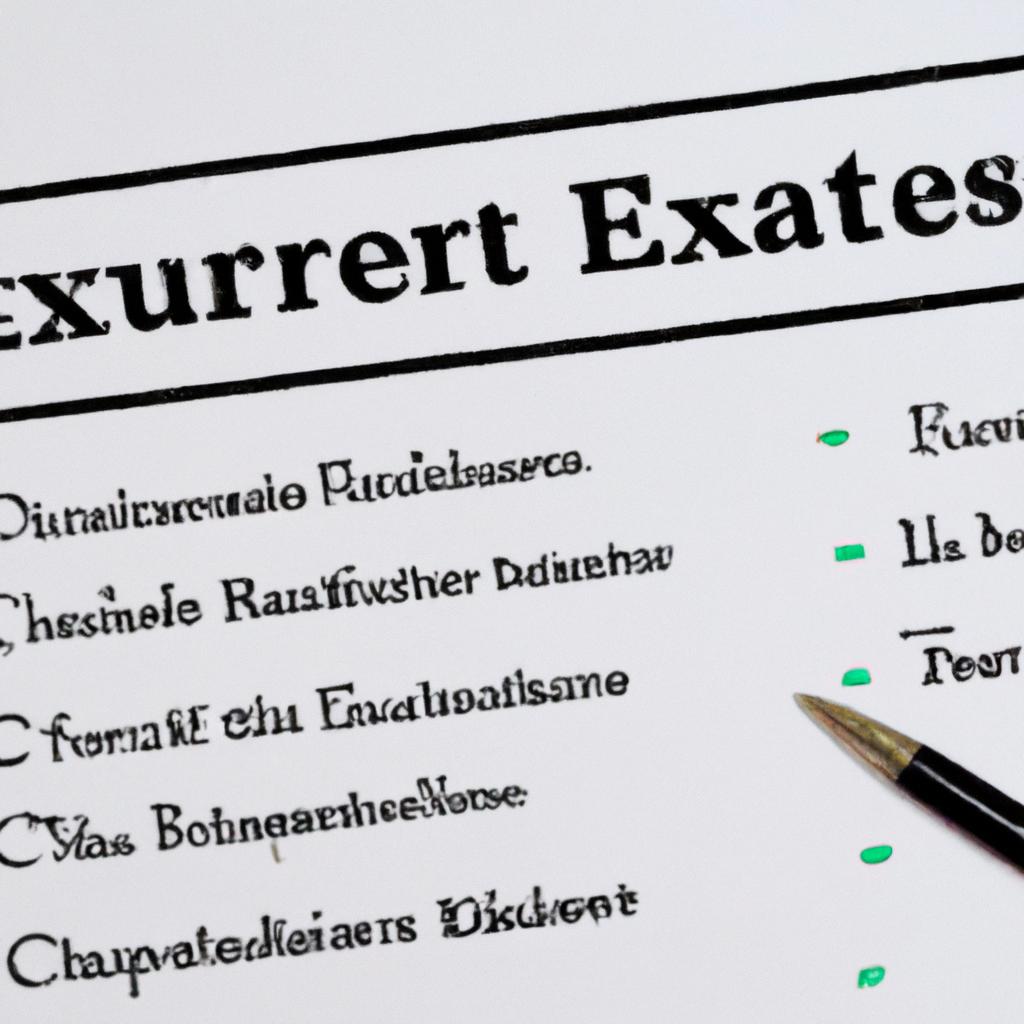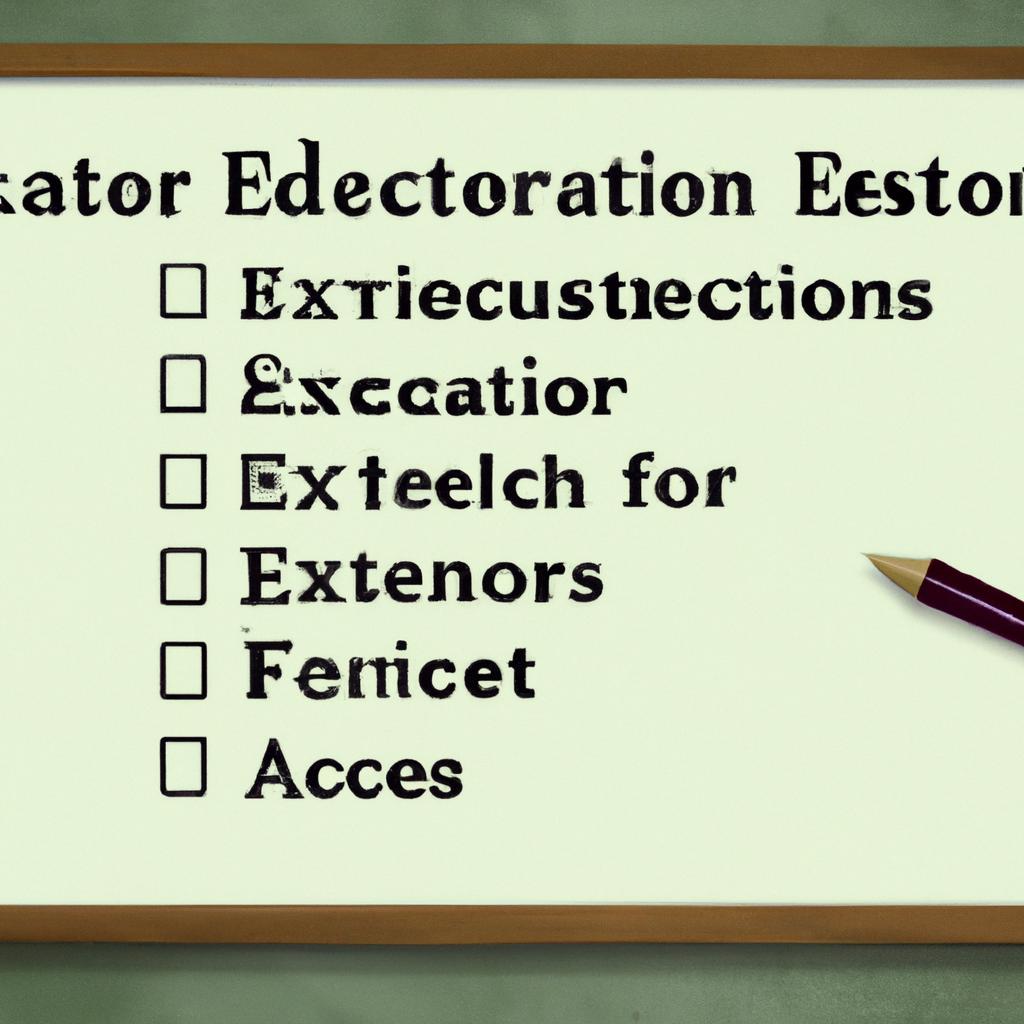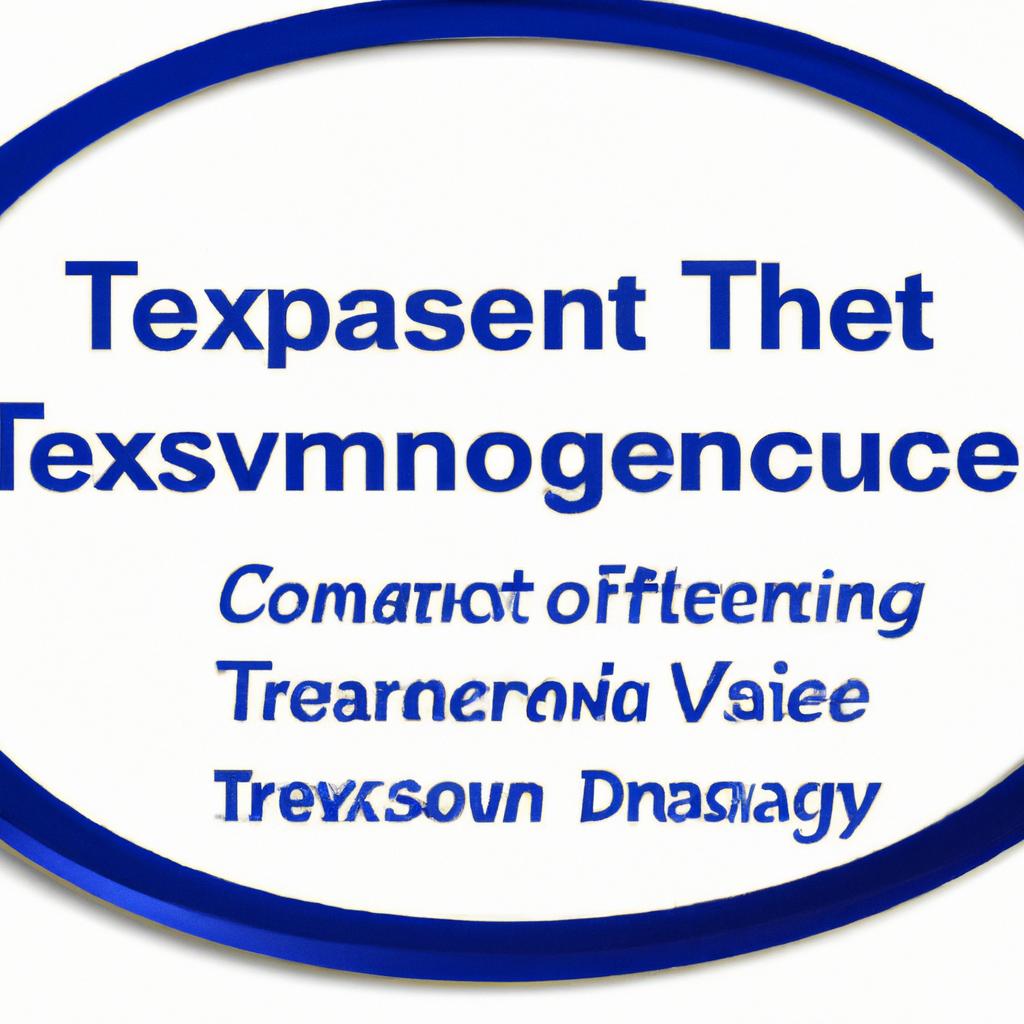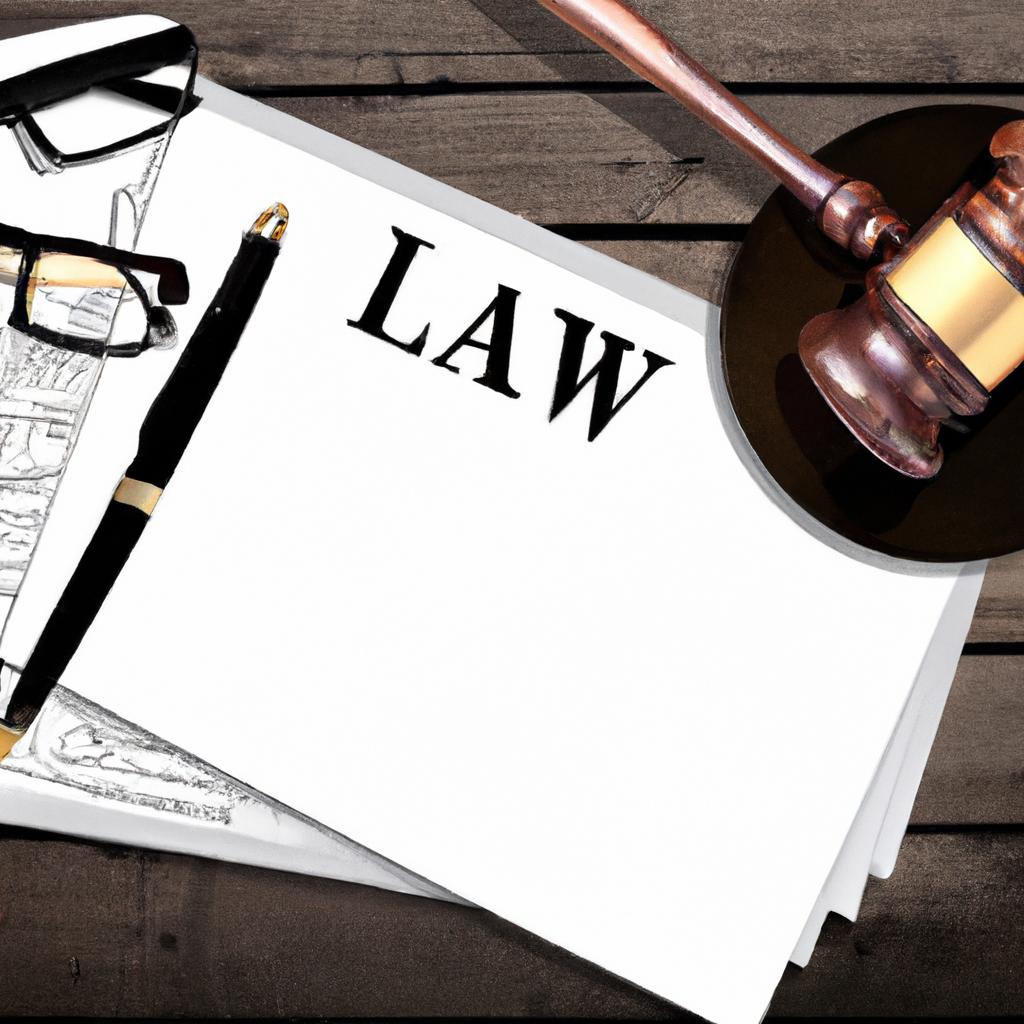In the intricate web of estate planning and administration, appointing a trusted individual to carry out one’s final wishes is paramount. As seasoned practitioners in the fields of probate, elder law, and estate planning, selecting a competent executor is a cornerstone of our practice at Morgan Legal Group in New York City. In this article, we delve into the essential steps and considerations for individuals seeking to identify and designate an executor to ensure the smooth execution of their estate upon their passing. Join us as we navigate the complexities of choosing an executor with precision and foresight.
Finding the Right Executor for Your Estate
When it comes to choosing an executor for your estate, it is essential to select someone who is not only trustworthy and reliable but also capable of handling the responsibilities that come with the role. The executor will be responsible for managing your assets, paying off any debts, and distributing your estate according to your wishes. Here are some tips on how to find the right executor for your estate:
- Evaluate Trustworthiness: Look for someone who is honest, responsible, and capable of carrying out your wishes.
- Consider Financial Acumen: Choose someone who is good with money and has a clear understanding of financial matters.
- Legal Knowledge: It is advisable to select someone with a basic understanding of estate planning and probate laws.
| Key Point | Details |
| Trustworthiness | The executor should be someone you trust completely to carry out your wishes. |
| Financial Acumen | It is crucial to choose an executor who can effectively manage your assets. |
| Legal Knowledge | Having a basic understanding of estate planning laws can be beneficial for the executor. |

Understanding the Responsibilities of an Executor
As an executor, you bear the crucial responsibility of carrying out the wishes outlined in the deceased’s will. This role requires a meticulous attention to detail and a deep understanding of legal and financial matters. Here are some key responsibilities of an executor:
- Administering the Estate: This involves gathering and managing the deceased’s assets, paying off debts and taxes, and distributing the remaining assets to beneficiaries.
- Communicating with Beneficiaries: Keeping beneficiaries informed about the progress of the estate administration process is essential to avoid misunderstandings and conflicts.
| Responsibility | Description |
| Asset Management | Ensure proper management and distribution of assets according to the will. |
| Legal Compliance | Ensure all legal requirements are met throughout the estate administration process. |
It is crucial to choose an executor carefully, as this individual will play a significant role in the settling of your estate. Consider consulting with an experienced estate planning attorney to ensure that your chosen executor understands the responsibilities involved and is prepared to fulfill them diligently.

Factors to Consider When Choosing an Executor
When selecting an executor for your estate, there are several important factors to take into consideration. The following points will guide you in choosing the right person for this crucial role:
- Trustworthiness: The executor should be someone you trust implicitly to carry out your wishes and handle your affairs responsibly.
- Organizational Skills: It is essential that the executor is organized and capable of managing complex financial and legal matters.
- Availability: The chosen executor should have the time and availability to dedicate to the administration of your estate.
Additionally, it is advisable to select someone who is emotionally stable and capable of handling potential conflicts that may arise among beneficiaries. A professional, such as a lawyer or accountant, can also be appointed as the executor to ensure the efficient administration of your estate.

Recommendations for Selecting a Trustworthy and Competent Executor
When selecting an executor for your estate, it is crucial to choose someone who is trustworthy and competent to carry out your final wishes. To ensure that your executor will fulfill their duties successfully, consider the following recommendations:
- Trustworthiness: Look for someone who is honest, reliable, and has integrity. Your executor should be someone you can trust to handle your affairs responsibly and ethically.
- Competence: Choose someone who is organized, detail-oriented, and financially savvy. Your executor will be responsible for managing your assets, paying off debts, and distributing your estate according to your Will.
By carefully selecting a trustworthy and competent executor, you can have peace of mind knowing that your estate will be handled properly and your final wishes will be carried out efficiently.
Q&A
Q: What is an executor and why do I need one?
A: An executor is someone who is appointed to carry out the instructions in your will after you pass away. They manage your estate, distribute your assets, and ensure your final wishes are carried out.
Q: How do I choose an executor?
A: When selecting an executor, it’s important to choose someone trustworthy, organized, and responsible. This person should be willing to take on the responsibility and have a good understanding of your wishes and financial affairs.
Q: Can I choose more than one executor?
A: Yes, you can choose more than one executor to act jointly or as backups in case the primary executor is unable to fulfill their duties. It’s important to discuss this with all parties involved to ensure everyone is on the same page.
Q: What happens if I don’t have an executor?
A: If you pass away without appointing an executor, the court will appoint someone to handle your estate. This process can be time-consuming, costly, and may not align with your wishes.
Q: How do I officially appoint an executor?
A: To officially appoint an executor, you must include their name and contact information in your will. It’s also a good idea to discuss this with your chosen executor beforehand to ensure they are willing and able to take on the role.
Q: Can I change my executor after I’ve appointed one?
A: Yes, you can change your executor at any time by updating your will with the new appointment. It’s important to communicate this change to your current executor and ensure they understand and accept the decision.
In Retrospect
In conclusion, securing an executor for your estate is a crucial step in ensuring your final wishes are carried out smoothly. Whether it’s a family member, a trusted friend, or a professional advisor, having someone reliable to oversee your affairs is essential. By following the tips and steps outlined in this article, you can find the perfect executor to handle your estate and provide you with peace of mind knowing your legacy is in good hands. So take the time to carefully select your executor and rest assured that your wishes will be honored when the time comes.
 How to Get an Executor: An Essential Guide for Executors and Estate Representatives
How to Get an Executor: An Essential Guide for Executors and Estate Representatives
As an executor, you have been tasked with the important responsibility of managing a loved one’s estate after their passing. This can be a daunting and overwhelming role, but it is also a great honor to be trusted with this important duty. One of the first steps in fulfilling your duties as an executor is understanding how to get an executor and what this role entails. This comprehensive guide will provide valuable information on how to get an executor, the responsibilities and legal aspects of the role, and practical tips for fulfilling your duties effectively.
What is an Executor?
Before we dive into the process of getting an executor, let’s first understand what it means to be an executor. An executor, also known as an estate representative, is a person appointed in a will to manage the affairs of a deceased person’s estate. This may include paying off debts and taxes, distributing assets to beneficiaries, and other administrative tasks. Executors play a crucial role in ensuring that a person’s final wishes are carried out and their assets are properly managed.
How to Get an Executor: Step-By-Step Guide
1. Check the Will
The first step in getting an executor is to check the will of the deceased person. If there is a will, it should name the executor. If the will does not name an executor or if there is no will at all, the court will appoint an executor. This person is usually a close family member or a trusted friend. It is important to note that an executor must be over 18 years old and mentally capable.
2. Obtain a Death Certificate
Before you can officially become an executor, you will need to obtain a death certificate for the deceased. This is a crucial document that will be needed for various legal and administrative tasks. You can obtain a death certificate from the funeral home or the vital records office in the state where the person passed away.
3. Apply for Letters Testamentary or Letters of Administration
Letters testamentary or letters of administration are court-issued documents that grant the executor authority to act on behalf of the deceased person’s estate. These can be obtained through the probate court in the county where the person lived at the time of their death. To obtain these letters, you will need to fill out an application and provide the death certificate, will (if there is one), and any other necessary documents.
4. Get Help from an Attorney
Managing a loved one’s estate can be complex and overwhelming, especially if you are not familiar with the legal process. It is highly recommended to seek the assistance of an estate planning or probate attorney to guide you through the process. An attorney can help you understand your responsibilities as an executor, complete necessary paperwork, and provide legal advice.
Responsibilities and Legal Aspects of Being an Executor
Being an executor comes with significant responsibilities and legal duties. These include:
1. Gathering and managing assets: As an executor, you must locate and collect all assets of the deceased person. This may include bank accounts, investments, real estate, and personal belongings. You will then be responsible for managing and protecting these assets until they can be distributed to beneficiaries.
2. Paying debts and taxes: The executor is responsible for paying off any debts owed by the deceased, including mortgages, credit card bills, and taxes. This requires careful record-keeping and ensuring that all debts are paid off before distributing assets to beneficiaries.
3. Distributing assets: After all debts and taxes have been paid, the executor can finally distribute the remaining assets according to the wishes outlined in the will. This must be done in a fair and impartial manner, and the executor may need to seek the court’s approval for certain distributions.
4. Communicating with beneficiaries: It is the executor’s duty to keep beneficiaries informed and updated throughout the process. This includes providing an inventory of assets, notifying them of any delays or issues, and answering any questions they may have.
5. Filing tax returns: The executor must file income and estate tax returns on behalf of the deceased person’s estate. This requires attention to detail and consulting with a tax professional to ensure all tax obligations are met.
Practical Tips for Fulfilling Your Duties as an Executor
1. Stay organized: Being an executor requires careful organization and record-keeping. Keep all necessary documents in a safe place and create a system to track expenses and distribute assets.
2. Communicate with beneficiaries: Open and regular communication with beneficiaries can help prevent misunderstandings and disputes. Keep them informed of the progress and any delays or issues that may arise.
3. Seek professional help: As mentioned earlier, seeking the assistance of an attorney and tax professional can greatly ease the burden of being an executor. These professionals can provide guidance and ensure that all legal and financial obligations are met.
4. Be mindful of emotions: Dealing with the loss of a loved one can be emotionally challenging, and being an executor can add extra stress and responsibility. It is important to prioritize self-care and seek support from friends and family during this time.
5. Document everything: It is crucial to keep a record of all your actions and decisions as an executor. This may include emails, receipts, and any other relevant documents. This will not only help you stay organized but also protect you from any potential legal issues.
Conclusion
Being an executor is an important role that comes with significant duties and responsibilities. By following the steps outlined in this guide and seeking professional help when needed, you can fulfill your duties effectively and ensure the wishes of the deceased are carried out. Remember to stay organized, communicate with beneficiaries, and seek support when needed. The executor plays a crucial role in honoring a loved one’s legacy and ensuring their assets are properly managed.


